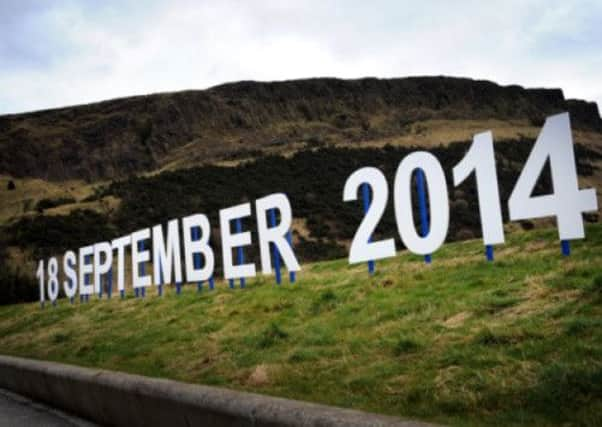Stuart Waiton: 16-year-olds and the referendum


Following Alex Salmond’s speech at the SNP conference in Perth, the headlines pronounced that “Salmond reaches out to the independence generation”. And there will indeed be a new “generation” of people voting in the election for independence, because for the first time ever, 16-year-olds will have the vote.
It seems that all the political parties in Scotland think this is a good idea. But why now? If it is so obvious, so straightforwardly democratic and just for 16-year-olds to have the right to vote, why on earth has it taken until now for this to happen?
Advertisement
Hide AdAdvertisement
Hide AdThe right to vote is a significant democratic right, something that for centuries has necessitated campaigns, and at times, violence to extend it to wider sections of society. Rarely has the franchise been widened without a fight, usually a fight from “below”.
Today, the opposite is the case – it is the political and professional elites in Scotland who are handing 16 and 17-year-olds the vote. When the trend is for fewer and fewer people to vote, indeed, for young people generally to be the least likely people to put a cross against any name in the polling booth, and for almost no young people to be members of political parties, this extension of the vote has clearly been manufactured by those in the corridors of power rather than on the streets.
The SNP may like to present itself as the sponsors of an “independence generation”, as defenders and promoters of independence and rights of young people, but in the real world, ironically, they are attacking the free choices that young people can actually make.
For example, in 2010 the SNP attempted to increase the legal age of buying alcohol from shops from 18 up to 21. While in 2007 a law was passed banning the sale of cigarettes to 16 and 17-year-olds. We end up in the strange situation where young people, classified as “at risk” or “vulnerable”, are seen as incapable of deciding what to spend their money on in their local corner shop, while being allowed to vote on independence.
For the first time ever we will have an increased number of young people able to vote for a nation’s right to self-determination, while the same young people, in their daily lives, are less able to determine their own selves. Voting for an independent nation does not, it seems, require independent people.
The hypocrisy of extending the vote to a group who haven’t asked for it while stripping away their personal freedoms is breathtaking.
People argue that 16-year-olds are independent and so must be given the vote. They are allowed to marry, for example. But they have been able to marry at 16 for a long time and were not given the vote previously, and noticeably, in England and Wales 16-year-olds can get married, but only with parental consent. The reality is that in the real world only around 2 per cent of under 20-year-olds (let alone 16-year-olds) do actually get married at this age. This compares with previous generations, when marrying young was relatively common.
“But 16-year-olds can join the army”, it is argued, so surely they should be given the vote. But again, yes, they can join the army, but they are not allowed to fight until they are 18. They are treated differently to other soldiers, who only at a later date are seen as fully responsible for their decisions. Indeed, this fits with the UN Convention of the Rights of the Child, something Scottish politicians generally celebrate, which defines childhood as belonging to anyone under the age of 18.
Advertisement
Hide AdAdvertisement
Hide Ad“They pay taxes”, we are told, but again, the trend for young people to be in full-time paid employment is on the decline, as more 16 and 17-year-olds stay on at school. And, as an aside, when eventually 17 and 18-year-olds do go to university open-days, to suss out what degree they are going to choose, they are almost always accompanied by their parents. Independence?
Indeed, if you ask 18 and 19-year-olds students themselves (who look back just a few years at themselves when they were 16) what they think about lowering the voting age, as I have, you will find the vast majority of them think that it makes no sense at all.
With all of this, one is drawn to the conclusion that the need for 16-year-olds to have the vote has not come from young people themselves, from a growing independence in their lives, or from wider society demanding democratic reform. Rather, it would appear that it is politicians who have almost single-handedly elevated the status of 16-year-olds.
But instead of this being understood as an enlightened reflection of the independent nature of young people, it smacks more of a patronising form of “empowerment” – that weasel word of modern times which embodies the oxymoronic nature of many of our new descriptions of things.
This is a patronising form of inclusion, indeed, an infantilisation of the importance of voting itself: Something that is to be given to a section of society who are largely still at school, or dependent on their parents, and have not had, of yet, to make or take any truly independent decisions in their lives.
What is ultimately reflected in the lowering of the voting age is a diminution of the importance of politics itself. A process that developed in the 1990s with condescending campaigns such as Rock the Vote: It doesn’t matter who you vote for, just get out there and vote, kids! And ends with indistinguishable political parties in Scotland kowtowing to the idea of 16-year-old children being given the vote, lest they be seen as old-fashioned and not on side with today’s yoof.
• Stuart Waiton is founder of Take a Liberty (Scotland) and author of Scared of the Kids? Curfews, crime and the regulation of youth